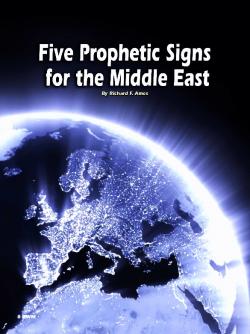Service or Selfishness?
Corruption in government is an age-old problem. Will rulers always choose their own interests over the interests of the governed? Scripture tells of a wonderful future of perfect government under Jesus Christ!
Are governments always corrupt? Are individuals always greedy? Is there an answer to the problem of corruption?
A recent Zogby International poll found that 69.2 percent of Americans "strongly agree" that corruption is "a significant problem in Washington, DC." Another 22.7 percent said they "somewhat agree" with that statement, meaning that more than 90 percent consider corruption a significant problem in their government!
The sad history of politics—and by no means just in the United States—is that government leaders often serve their own interests more than the interests of those they govern. And it is often at the expense of those they had supposedly dedicated themselves to serve. As a new President and newly elected Congress take their seats in government, will these public servants fulfill Americans' hopes, or confirm their fears? In the months and years ahead, will elections in other countries around the world bring new policies, better government, more service and less selfishness?
Only time will tell. But if history reveals the answer, the same cycle—selfishness and even corruption and cronyism—will be repeated over and over again.
When will the cycle end? Will it ever end? Will the U.S.—and other nations around the world—ever be governed in true equity, righteousness and selflessness, by moral principles, for the benefit of the governed?
The surprising answer is, "Yes!" But how and when will that happen?
Governing by Self-Interest
Political scientists have long observed that greed, and consuming self-interest among governing officials is perhaps "the most challenging governance problem afflicting many countries" (Challenging Corruption in Asia, p. 1). In recent years, high-level political leaders in the Philippines, Indonesia, China and Thailand are among those who have been involved in corruption-related charges.
Additionally, as many as four million Zimbabweans have fled their country as a result of the alleged corruption and brutality of their nation's president, Robert Mugabe. Pakistan's recently elected president, Asif Zardari, had been accused of enriching himself while his late wife, Benazir Bhutto, was prime minister. Zardari even earned the dubious nickname, "Mr. 10 percent" because of his alleged corruption.
In Mexico, 44,000 federal, state and local policemen are being evaluated in the government's effort to stamp out corruption, according to Genaro García Luna, the nation's secretary of public safety. The list of countries dealing with corruption goes on and on.
But it is not just individual countries that struggle with corruption. The United Nations has itself been embroiled in charges of corruption, such as the "food-for-oil" scandal, which saw $21 billion squandered in deals with Saddam Hussein.
Nations all over the world face the terrible corrosion caused by corruption and cronyism. Western nations are certainly not immune from these problems. Outgoing President George W. Bush has been dogged by accusations of cronyism during his tenure. Some Americans were shocked last December when Rod Blagojevich, governor of the state of Illinois, was arrested on federal charges of conspiracy and bribery, but to others the arrest merely confirmed their worst suspicions about corrupt Illinois politics.
Are leaders necessarily corrupt? God laid the ground rules for leadership thousands of years ago. He said through the prophet David, "He who rules over men must be just, ruling in the fear of God" (2 Samuel 23:3–4). Moses delivered to the Israelites God's statute forbidding the corruption of justice in government: "You shall not pervert justice; you shall not show partiality, nor take a bribe, for a bribe blinds the eyes of the wise and twists the words of the righteous" (Deuteronomy 16:19). Too often our world turns a blind eye to God's word—and instead takes the bribe.
But can we call it "corruption" when nations or individuals set aside ordinary justice or morality to pursue policies they say are in the "national interest"? Yes, we can. Again and again, we see that decisions guided only by one nation's "self-interest"—without regard for overriding principles of a higher morality and standard that would prohibit those decisions—often lead to disastrous results.
For example, many Americans today are troubled by Iran's hatred of the United States, but do not realize that the U.S. played a part in inciting that hatred. In 1953, it was the U.S. Central Intelligence Agency that played a part in the toppling of Mohammed Mossadegh, Iran's democratically elected Prime Minister. Why did the U.S. disrupt another nation's democratic process? Was it to serve the "national interest" of U.S. ally Great Britain, which sought to ensure uninterrupted access to Iranian oil, of which it had held a monopoly before the nationalization movement in Iran?
Governments everywhere, in every part of the globe—including the United States—all too often run on selfishness and self-interest, rather than the guidance of universal, overarching principles of morality.
Does Selfishness Work?
Amazingly, there are some who believe that out-and-out corruption may be good for a nation's economy and society. Perhaps this is one reason why corruption persists—there simply is no universal agreement that it is wrong.
As political scientist Vito Tanzi pointed out, "Not too many years ago, the economic successes of the countries of East Asia were attributed by some observers to a presumably positive impact of corruption in facilitating decision-making" (ibid., p. 1). And yet, corruption places a huge financial burden against a nation's economic success; for example, estimates place the cost of Nigeria's corruption at $400 billion, according to official estimates ("The good, the bad, and the president," Economist, January 3, 2008).
Some point to the astounding economic growth in corruption-ridden societies as a "stamp of approval" of their practices. Filipino economist Alejandro Lichauco, writing for the Manila daily newspaper Today, suggested that corruption had not prevented India from becoming a global economic power: "Today, despite pervasive corruption and cronyism, India is a fully industrialized economy, self-sufficient in food, a nuclear power with a growth rate over the last several years of 6 percent to 7.8 percent… India today manufactures just about every category of consumer goods, has a highly developed capital goods industry… and is supplying the world with experts in information technology" ("The ultimate corruption," March 11, 2000).
But does economic growth really argue the case for corruption? How much more might a nation have grown without the corrosive and downward pull of corruption?
Some justify corruption because they see it as a vital way of doing business and increasing sales. They believe that "playing by the rules" would actually handicap them in their competition with other businesses (Challenging Corruption in Asia, p. 3). But, as author Daniel Jordan Smith notes, government corruption creates a climate like we see today in Nigeria, where people believe they must "resort to any means available to achieve their own economic aspirations" even in terms of breaking laws of the land (A Culture of Corruption: Everyday Deception and Popular Discontent in Nigeria, p. 30).
In the West, we are often shocked and surprised at the justifications some offer for corruption. We may be quick to deplore the bribes and "gift exchanges" we see practiced in Asian and African nations—but what do we see when we look closer to home? Ted Stevens was a "successful" Senator—the longest-serving Republican in the Senate before his defeat last November. Even though he had long been dogged by charges of corruption, and had been convicted on seven felony counts shortly before the election, nearly half of Alaska's voters wanted to return him to Washington. "He's good for Alaska," some said, excusing his corruption because they felt they and their state were the beneficiaries.
Can people's greed be good for those they are supposed to serve? One classic expression of the "greed is good" idea was infamously vocalized by the character Gordon Gekko in the 1987 movie Wall Street. It could be said that the U.S. government, too, has lived up to that expression, running up trillions of dollars in deficits, unwilling to pay down debts or curb spending. The fall of the dollar, rise of the price of oil, and collapse of the housing market in recent years has made this debt load even more dangerous and risky.
Greed in government—whether played out through corruption or simply excess and materialism—is definitely not "good."
Even Solomon Fell for It
Modern nations are not the first to fall into patterns of greed and excess. Almost 3,000 years ago, King Solomon inherited from his father David the powerful empire of Israel. Solomon reigned over ancient Israel during a period of peace and great prosperity. The Queen of Sheba was astonished at what a wise and understanding leader Solomon was, and how blessed his people were (1 Kings 10:8).
But Solomon's prosperity went to his head. The king embarked on an ambitious program to experience the best of everything, withholding nothing from himself. He documented the story in Ecclesiastes: "I, the Preacher, was king over Israel in Jerusalem… I searched in my heart how to gratify my flesh with wine, while guiding my heart with wisdom, and how to lay hold on folly, till I might see what was good for the sons of men to do under heaven all the days of their lives. I made my works great, I built myself houses, and planted myself vineyards" (Ecclesiastes 1:12; 2:3–4).
As Israel's king—the head of its government—Solomon had at his disposal a tremendous amount of wealth. And he spent it lavishly on himself! "I acquired male and female servants, and had servants born in my house. Yes, I had greater possessions of herds and flocks than all who were in Jerusalem before me" (v. 7). Even in Solomon's day, leaders were vainly comparing their wealth with others!
What was the result of Solomon's massive spending program? Did it bring him happiness? "Then I looked on all the works that my hands had done and on the labor in which I had toiled; and indeed all was vanity and grasping for the wind" (v. 11). It was empty. It was vanity. It had been all for nothing.
Worse than that, Solomon's experiments had devastating and long-lasting consequences for his nation. Rehoboam came to the throne after his father Solomon's death, and all was not well in Israel. "Then Jeroboam and the whole assembly of Israel came and spoke to Rehoboam, saying, 'Your father made our yoke heavy; now therefore, lighten the burdensome service of your father, and his heavy yoke which he put on us, and we will serve you" (1 Kings 12:3–4).
What was the result of Solomon's excess? It had placed a heavy burden on those he governed. Yet, instead of wisely lightening the burden of the people, Rehoboam threatened to make that burden even heavier. A civil war ensued, and ten tribes broke away from Rehoboam's leadership. Rehoboam was left as king over Judah and Benjamin, while the other tribes formed the northern nation called Israel. Solomon's grand plan to enjoy the unlimited and ever-expanding wealth of a king degenerated into utter failure, bringing emptiness to the king and the division of the kingdom under his son.
Government Meant for Service, Not Selfishness
Although Israel's leaders often failed, God made it clear that He never intended for them to use their positions of rulership to serve their own vanity and greed. In fact, when speaking to the Israelites, God said that a coming king of Israel should not "multiply horses for himself" nor "multiply wives for himself, lest his heart turn away; nor shall he greatly multiply silver and gold for himself" (Deuteronomy 17:16–17). A king was not to live to excess at the expense of his people.
Neither was he to rule based on self-interest or expediency. He was to rule based on God's laws! How would he know God's laws? He was to study them as part of his job. "Also it shall be, when he sits on the throne of his kingdom, that he shall write for himself a copy of this law in a book, from the one before the priests, the Levites" (v. 18). The king wrote out his own personal copy of God's law—and he was to study it!
"And it shall be with him, and he shall read it all the days of his life, that he may learn to fear the Lord his God and be careful to observe all the words of this law and these statutes, that his heart may not be lifted above his brethren, that he may not turn aside from the commandment to the right hand or to the left, and that he may prolong his days in his kingdom, he and his children in the midst of Israel" (vv. 19–20). God decreed that the leaders of Israel should read—and follow—His book of the Law, and it would be the guide for governing the nation.
America, Canada, Great Britain, Australia, New Zealand, South Africa, and other nations of Northwest Europe are the modern descendants of Israel today. Will our leaders study God's word to guide their decisions in directing the nation? Or will they continue down the national trends of putting God out of our public places, dishonoring His name, His Laws, and His ways in modern Israel? For more information on who the modern nations of Israel are, please write for The United States and Great Britain in Prophecy.
A Coming Servant King
An age is soon coming in which humanity will see an end to the rampant corruption and feverish greed that affects so many nations and individuals today. When the risen Jesus Christ returns to Earth, to reign as King of kings and Lord of lords, He will usher in a prosperous millennial reign (Revelation 17:14; 20:4).
What will His reign be like? One of His first priorities will be to punish the leaders who, instead of feeding His flock, have been fleecing them for personal gain. "'Woe to the shepherds who destroy and scatter the sheep of My pasture!' says the Lord… 'You have scattered My flock, driven them away, and not attended to them. Behold, I will attend to you for the evil of your doings,' says the Lord" (Jeremiah 23:1–2).
God is not pleased with leaders who feed only themselves—serving only their own self-interest—at the expense of others. He is the One who sets leaders up and takes them down (Daniel 4:32). He will hold them accountable for how they govern.
As a ruler, Jesus Christ will show great care for His flock as He takes His place as the supreme King on planet Earth. The modern Israelite nations, taken into captivity because of their sins, will be released from their bondage, and Christ the King will comfort and encourage them. "'But I will gather the remnant of My flock out of all countries where I have driven them, and bring them back to their folds; and they shall be fruitful and increase. I will set up shepherds over them who will feed them; and they shall fear no more, nor be dismayed, nor shall they be lacking,' says the Lord" (Jeremiah 23:3–4).
Jesus Christ will not be governing alone. He will be assisted by the glorified, resurrected saints—the "firstfruits"—Christians who in this present age have lived their lives faithfully, yielding with the help of the Holy Spirit to learn to obey His law of love. Yes, this means that you and I, living today, can assist our Savior in ruling in the Millennium, if we truly accept Him as our Lord—our "Boss"—and strive to do what He says! We can be a part of His plan to bring sanity and justice to the whole world!
What a wonderful world that will be! "Behold, the Lord God shall come with a strong hand, and His arm shall rule for Him; behold, His reward is with Him, and His work before Him. He will feed His flock like a shepherd; He will gather the lambs with His arm, and carry them in His bosom, and gently lead those who are with young" (Isaiah 40:10–11).
Jesus Christ, the most powerful ruler the world will ever have known, will rule not as a tyrant, but as a loving shepherd. He will be a righteous judge, who will judge the poor fairly and righteously, without partiality (Isaiah 11:3–4).
Overcome the Love of Money
If we want to be with Jesus Christ in His soon-coming Kingdom, we have to learn to reject the false gospel of consumption, consumerism, and greed now! Almost 2,000 years ago, the Apostle Paul wrote to Timothy about this. He said, "Now godliness with contentment is great gain" (1 Timothy 6:6). Each of us should practice contentment. We should learn to appreciate what we have, and not always seek to have more. Greed is not good.
Paul continued: "For we brought nothing into this world, and it is certain we can carry nothing out. And having food and clothing, with these we shall be content. But those who desire to be rich fall into temptation and a snare, and into many foolish and harmful lusts which drown men in destruction and perdition. For the love of money is a root of all kinds of evil, for which some have strayed from the faith in their greediness, and pierced themselves through with many sorrows" (vv. 7–10).
The love of money—selfishness, self-centeredness, greed and covetousness—causes untold misery individually, and nationally. Jesus Christ cautioned us, "Take heed and beware of covetousness, for one's life does not consist in the abundance of the things he possesses" (Luke 12:15). If we want to reign with Christ, we must heed His advice and resist the temptation to follow materialistic pursuits. We must instead follow Him.
Do not fall for greed. Through God's Spirit and help, develop a spirit of contentment and selflessness, in service to God and others. You will be doing God's will, and preparing for a better world to come.






